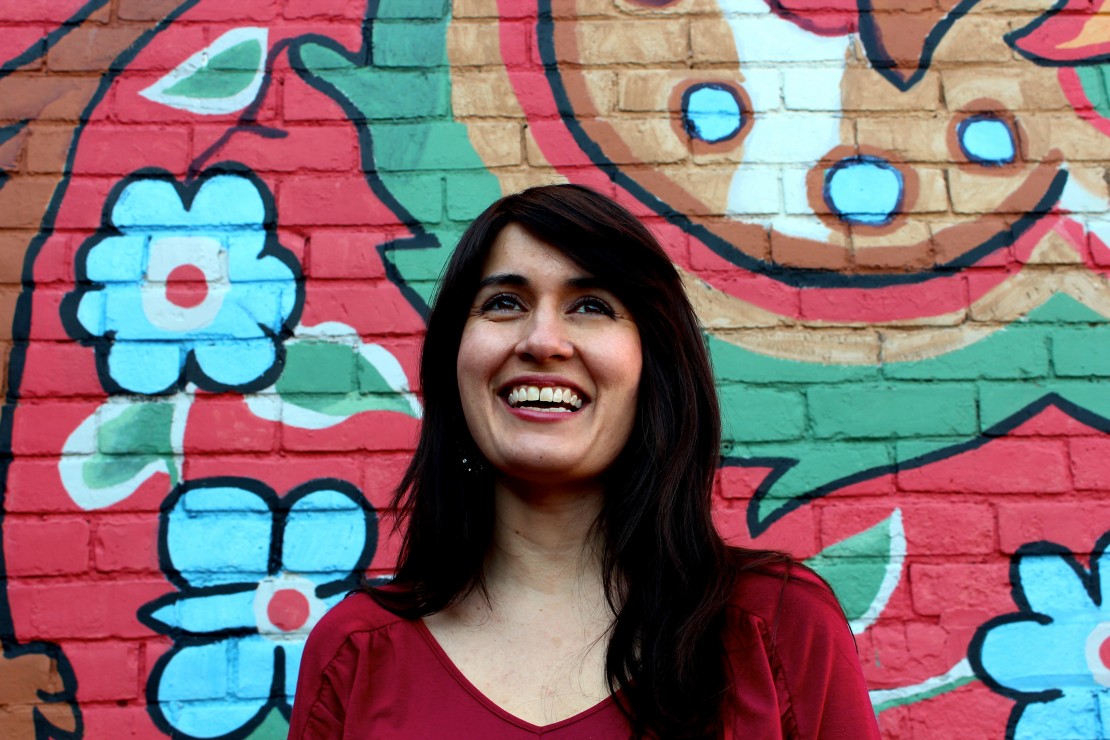
Farrah Khan, a renowned public speaker and educator on the issue of sexual assault and gender-based violence, made an appearance at UVic on Sept. 28. Photo by Vivek Shayra
Last Wednesday, Sept. 28, an audience of over one hundred people filled the Farquhar Auditorium for a keynote presentation on sexualized and gender-based violence titled “We Begin By Listening,” presented by Farrah Khan.
Khan, a counsellor with over 16 years of experience speaking on issues of gender-based violence, is Co-Chair of the Ontario Roundtable of Violence Against Women, and sits on the Advisory Council for the Federal Strategy Against Gender-based Violence. Her keynote was co-hosted by the UVSS, Anti-Violence Project, and UVic.
The first to take the stage, however, were Selina Beltran and Kevin Henry, who reminded all in attendance that the presentation was taking place on the lands of the Lekwungen and WSÁNÉC peoples. They reminded the audience that the lands in question were taken by force without consent — a chilling parallel to the evening’s subject matter, and one which would be repeated by all the speakers that followed.
A pair of poetry readings followed. Ann-Bernice Thomas, Victoria’s Youth Poet Laureate, recited her works “Kiss. Or. Two Drunk Girls Leaving a Party” and “Inheritance Gifts Pt. 2“ — the former a powerful exploration of consent between bisexual women.
Jeremy Loveday, Victoria city councillor and two-time Victoria Poetry Slam Champion, went on to read his acclaimed poem “Masks Off — A Challenge to Men” and an untitled work he had written for the occasion. Both meditated on the role of masculinity in rape culture.
Khan then took to the stage. Her keynote was conversational and empathetic, as she walked the tightrope of addressing sexual violence without becoming mired in the horrors inherent therein.
She touched on a range of topics: the nature of consent; the silencing around sexual violence takes place within the LGBT community; how race plays such a huge factor in how the media addresses both survivors and perpetrators of sexual assault; and how the very words we use to speak about sex affect our understanding of the issues — particularly how sex and virginity are often spoken of as commodities which cisgender women give out or save until marriage.
On the specific issue of sexual violence at college and university campuses, Khan argued that it was a foundational issue that begins with lack of education. “What have we been talking to young people about the past 15 years? When they were in grade school and high school?” she asked the audience. “Because we weren’t talking about consent, we weren’t talking about boundaries, and we sure as heck weren’t talking about pleasure”.
The question of pleasure was an important theme throughout her talk, as she emphasized sex positivism while dismissing claims that asking for consent might “take away from the mood.”
“I kind of want to know if what my partner finds what I’m doing hot,” she said.
In an era where the terms ‘safe space’ and ‘trigger warning’ have become buzzwords in a culture war, they had never felt more appropriate than in this setting. As Khan delved into the experiences of individuals like Anita Hill or Elizabeth Smart, one could make out the sound of quiet sobs, or concerned whispers of ‘Are you okay?’ between audience members.
But Miss Khan handled the subject with delicacy, taking several breaks to make self-deprecating jokes, remind the audience to breathe, or simply show pictures of cute furry animals. She offered examples to inspire, such as The Apology, a documentary that focuses on women who were forced into sexual slavery by the Japanese Army during the Second World War and have now begun to tell their stories.
Khan’s keynote gave those in attendance a lot to think about regarding issues which won’t be solved in an evening. It underscored the importance in providing a space in our communities where conversations can take place addressing sexual violence. And that while we all should speak out on the issue, our first step must be to listen.
For more information on Farrah Khan and her advocacy work, visit her website at farrahkhan.ca.






